Five Northwest Dharma Leaders Graduate
From Fifth Community Dharma Leaders Program
Written by: Meg Agnew
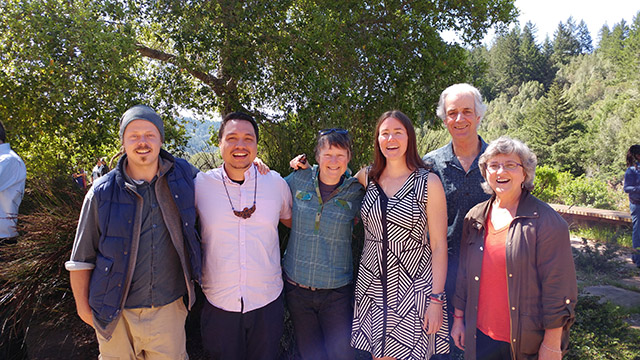
Five Northwest people graduated from the fifth Community Dharma Leaders program, ready to support others in the region.
Five Northwesterners are offering more dharma teachings in the region, after graduating from the fifth Community Dharma Leaders Program in California.
The five were among about 100 people from around the world who completed the two-year program, called CDL5 by participants. The April 29 graduation ceremony was at Spirit Rock meditation center in California.
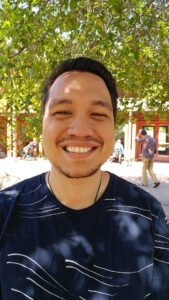
Chris Charles is a leader in Native American studies at the University of Washington, as well as a Dharma teacher.
The Northwest contingent included Emily Carpenter, Portland; Chris Charles, Seattle; Mary Haberman, Bellingham, Wash.; Justin Michelson, Eugene, Ore.; and Steve Wilhelm, Kirkland, Wash.
The primary intention of the program is to train a highly diverse group of dharma leaders to serve populations marginalized by race, sexual orientation, gender identification, class or geography. Many CDL graduates lead meditation groups in locales without a resident Dharma teacher.
The large size of these training classes ensures a great array of talents and interests among the participants, who offer the Dharma in a variety of settings. Many are also involved in the social justice work of engaged Buddhism.
CDL programs are designed so students learn a tremendous amount from each other, just as they do from the guest teachers, the principal teachers, and the teacher trainees who assist them.
For instance early on in CDL5 a group of trainees developed a white privilege training, which was taken by most as a training within the CDL5 program. The four principal guiding teachers for CDL5 were Eugene Cash, Gina Sharpe, Pamela Weiss and Larry Yang.
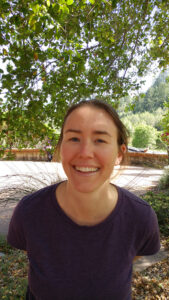
Emily Carpenter is a Dharma teacher who recently moved to Portland.
One thing the trainees shared at the start of the program was not knowing what to expect. Unlike many other Buddhist training programs, CDL training is a very fluid process. The teachers have a general idea of what will be offered but the primary purpose is for the participants to gain experience creating a supportive and inclusive sangha. This will be a uniquely organic experience for each training group. It can feel chaotic and messy at times.
As a graduate of the preceding CDL4 training, I know first-hand that the process calls on everyone to cultivate patience and persistence, and to be willing to flow with uncertainty as the community comes together.
The group’s great diversity also ensures a rich experience for participants, as they learn to be sensitive to different perspectives and to meet the varying and sometimes-conflicting needs of other trainees.
Carpenter, a meditation coach for the 10% Happier App, shared how teacher Yang explained to the group that when conflicts arise we can learn to fall together instead of apart. The group learned to approach arising issues as teaching opportunities, modeled by guiding teachers.
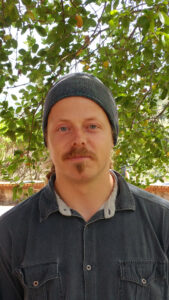
Justin Michelson is a community organizer and Dharma teacher.
Wilhelm, who co-leads Eastside Insight Meditation with his wife Ellen, said the way guiding teachers met these challenging situations with wisdom and humor felt like a kind of transmission. It was a remarkable learning opportunity that CDL5 grads noted with much gratitude.
Graduates described how participating in CDL5 training increased their leadership skills. Some of them are returning to what they were doing prior to the training, but with greater confidence in their ability to lead and with refined sensitivity to the needs of the communities they are serving. One graduate said she wants to explore taking on the role of Dharma leader as a path of selfless service.
Since the start of the CDL5 training Michelson has been very involved with expanding Eugene Insight Meditation. While taking on a variety of roles there, he also started a six-week course for beginning meditators in Eugene, and a weekly sitting group in Dexter, Oregon.
Haberman, a board member of the Bellingham Insight Meditation Society and a teacher at Whatcom Community College, appreciated the training’s emphasis on the importance of being authentic when leading. She resonated with the idea that each of us has unique gifts, and that being a leader comes with the added responsibility of being true to oneself and the talents and skills one has to offer.
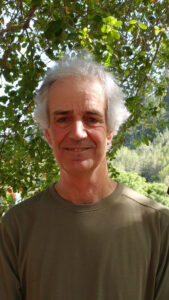
Steve Wilhelm is an editor and writer, and Dharma teacher.
Since the start of her training as a dharma leader Haberman has begun a weekly drop-in mindfulness meditation group for the students at her college.
Although CDL5 training has come to an end, the relationships formed there will continue. Tremendous bonding goes on during the process of becoming a large, diverse and close-knit Sangha. Each trainee becomes a member of a national and sometimes international network of dedicated Buddhist practitioners. Lasting friendships are formed. Challenges have been met and lots of fun has been had.
Haberman said it sometimes felt like being at Dharma camp complete with new friends, talent shows, and other fun activities. She admitted to initiating an incredibly joyful and spontaneous Ultimate game at one of the CDL5 retreats.
During CDL4 many of us participated in a very enthusiastic choir that performed at the end of all our retreats. You can never be exactly sure what will happen at a CDL training, but you can count on it being an experience that expands your sense of what you can contribute and how to skillfully connect with others in the Dharma.
